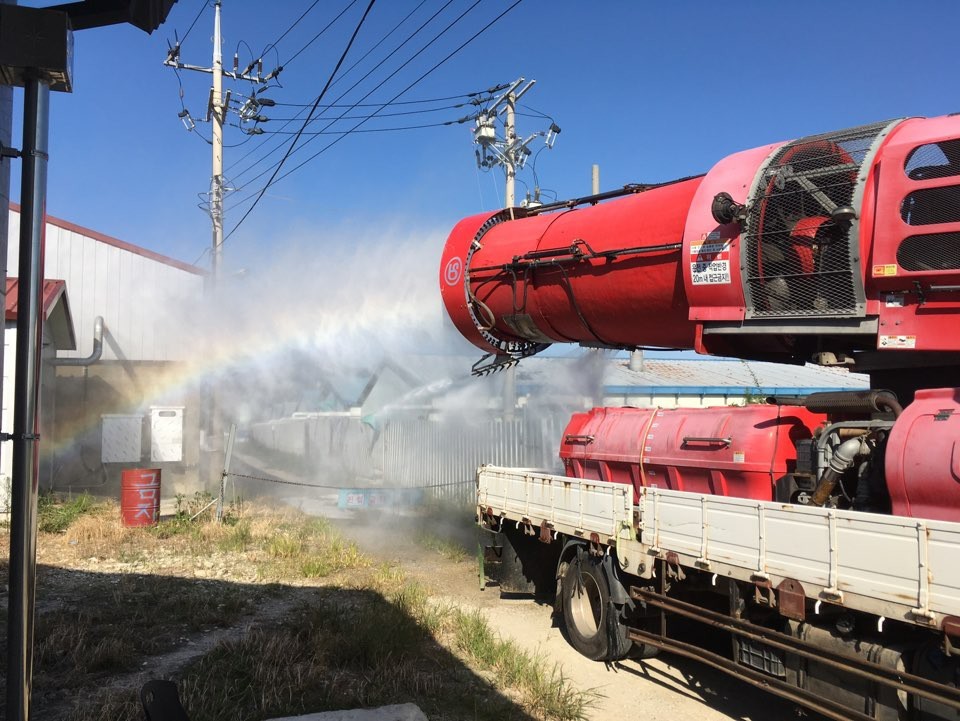SEJONG -- Five cases of African swine fever were confirmed in South Korea in the week from Sept. 17. The incubation period is one week or more.
On Tuesday, the fourth and fifth cases of the deadly virus were detected at a hog farm in Gyeonggi Province's Paju and Incheon City's Ganghwa, following the previous day’s case at a farm in Gimpo, Gyeonggi Province.
Since the first outbreak, Paju has recorded two ASF cases, and Yeoncheon, Gimpo and Ganghwa have seen one each.
Quarantine officials are on alert due to the possibility that ASF could spread to the eastern part of the country, particularly Gangwon Province, where hog raising firms are located in regions including Wonju and Chuncheon.
Other areas considered risky are Hwaseong, Pyeongtaek, Anseong, Yangpyeong, Icheon, Yeoju, Yongin and Gwangju, all of which are located in southern or eastern Gyeonggi Province.
On Tuesday, the fourth and fifth cases of the deadly virus were detected at a hog farm in Gyeonggi Province's Paju and Incheon City's Ganghwa, following the previous day’s case at a farm in Gimpo, Gyeonggi Province.
Since the first outbreak, Paju has recorded two ASF cases, and Yeoncheon, Gimpo and Ganghwa have seen one each.
Quarantine officials are on alert due to the possibility that ASF could spread to the eastern part of the country, particularly Gangwon Province, where hog raising firms are located in regions including Wonju and Chuncheon.
Other areas considered risky are Hwaseong, Pyeongtaek, Anseong, Yangpyeong, Icheon, Yeoju, Yongin and Gwangju, all of which are located in southern or eastern Gyeonggi Province.

Additionally, hog raisers in regions -- such as Cheonan, Seosan, Yesan, Hongseong, Gongju, Cheongyang in South Chungcheong Province and neighboring Sejong Autonomous City -- have expressed their mounting concerns.
The Ministry of Agriculture, Food and Rural Affairs on Tuesday issued a “standstill,” a movement ban on all hog raising industry employees nationwide for 48 hours until noon this Thursday.
In addition, the number of hogs in Gimpo, Paju and Yeoncheon to be culled is estimated to reach 20,808 by this week. The mass cull target is exected to expand in the wake of the fifth outbreak in Incheon.
More than 6,000 farms nationwide have a total of 11.3 million hogs, according to the Korea Institute for Animal Products Quality Evaluation.
South Chungcheong Province topped the list with 2.3 million pigs, followed by Gyeonggi Province with 1.9 million.
Gyeonggi Province has the largest number of hog farms, 1,250, and South Chungcheong Province is next with 1,142. Together, the two provinces account for 35 to 40 percent of hog farms nationwide.
Other major regions include North Gyeongsang Province and North Jeolla Province.
In addition, North Chungcheong Province is the center of slaughterhouses for pork products.
ASF has a 100 percent mortality rate for infected pigs, but doctors and veterinarians say it cannot infect humans. Cooked pork presents little risk, even if the pigs are infected with the virus, according to ministry officials.
The Agriculture Ministry has said it would “intensively sterilize the farms in the six areas by mobilizing as many disinfection vehicles as possible.”
In North Korea in late May, a case of ASF was reported in Jagang Province, which borders China.
The South Korean government has yet to publicize information as to whether there was an outbreak in the southern part of North Korea, close to Ganghwa, Gimpo, Paju and Yeoncheon, over the past few months.
(kys@heraldcorp.com)






![[From the Scene] Monks, Buddhists hail return of remains of Buddhas](http://res.heraldm.com/phpwas/restmb_idxmake.php?idx=644&simg=/content/image/2024/04/19/20240419050617_0.jpg&u=20240419175937)





![[Graphic News] French bulldog most popular breed in US, Maltese most popular in Korea](http://res.heraldm.com/phpwas/restmb_idxmake.php?idx=644&simg=/content/image/2024/04/18/20240418050864_0.gif&u=)


![[From the Scene] Monks, Buddhists hail return of remains of Buddhas](http://res.heraldm.com/phpwas/restmb_idxmake.php?idx=652&simg=/content/image/2024/04/19/20240419050617_0.jpg&u=20240419175937)

![[KH Explains] Hyundai's full hybrid edge to pay off amid slow transition to pure EVs](http://res.heraldm.com/phpwas/restmb_idxmake.php?idx=652&simg=/content/image/2024/04/18/20240418050645_0.jpg&u=20240419100350)

![[Today’s K-pop] Illit drops debut single remix](http://res.heraldm.com/phpwas/restmb_idxmake.php?idx=642&simg=/content/image/2024/04/19/20240419050612_0.jpg&u=)